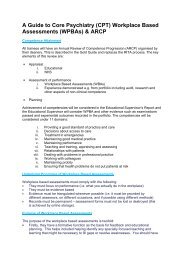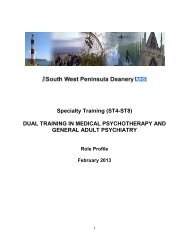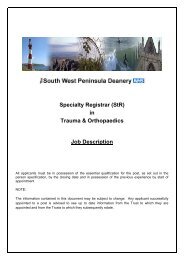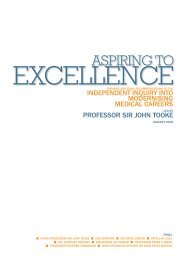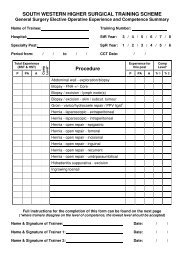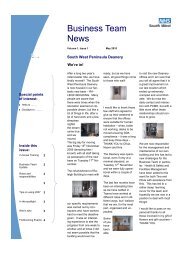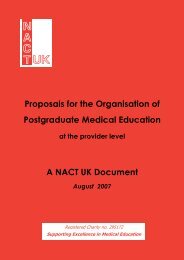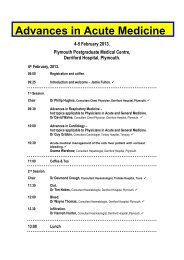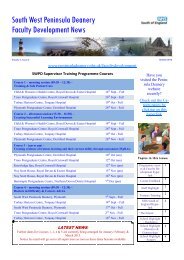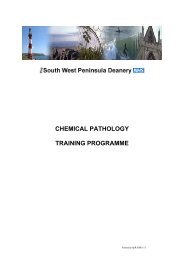Professor Malcolm Lewis Chair of Continued Practice, Revalidation ...
Professor Malcolm Lewis Chair of Continued Practice, Revalidation ...
Professor Malcolm Lewis Chair of Continued Practice, Revalidation ...
You also want an ePaper? Increase the reach of your titles
YUMPU automatically turns print PDFs into web optimized ePapers that Google loves.
<strong>Pr<strong>of</strong>essor</strong> <strong>Malcolm</strong> <strong>Lewis</strong><br />
<strong>Chair</strong> <strong>of</strong> <strong>Continued</strong> <strong>Practice</strong>, <strong>Revalidation</strong> and<br />
Registration Board, GMC
Why revalidation matters<br />
• The state <strong>of</strong> the medical workforce is<br />
critical to safe, high quality care<br />
• Effective clinical governance is a<br />
prerequisite for safety and quality<br />
• <strong>Revalidation</strong> will be built on and can be a<br />
catalyst for effective clinical governance
Governance <strong>of</strong> <strong>Revalidation</strong><br />
•GMC<br />
•Council<br />
•<strong>Continued</strong> <strong>Practice</strong> <strong>Revalidation</strong><br />
and Registration Board<br />
•UK <strong>Revalidation</strong> Programme<br />
Board (oversight, consistency)<br />
•National Delivery Boards<br />
•RST (England);<br />
Implementation Group (Wales
Responsibilities<br />
• Designated Organisations<br />
- Must appoint Responsible Officers<br />
- Support ROs in delivering revalidation<br />
• Responsible Officers<br />
- Ensure robust system <strong>of</strong> clinical<br />
governance<br />
- Ensure doctors have annual appraisal<br />
• The 4 Health Departments<br />
- Commitment via Statement <strong>of</strong> Intent to<br />
deliver revalidation in late 2012
Support for <strong>Revalidation</strong><br />
• Responsible Officers need the support <strong>of</strong><br />
NHS leaders<br />
• GMC Employer Liaison advisers – to<br />
support and advise ROs
The prize<br />
• Earlier identification <strong>of</strong> problems<br />
• Better support for critical human resource<br />
• Patient safety will come first<br />
• UK will lead the world
1999 – 2004 - GMC develops proposals and runs<br />
pilots<br />
2004 – Shipman Inquiry Fifth report<br />
2006 – CMO report Good Doctors Safer Patients<br />
2007 – Whitepaper Trust Assurance and Safety<br />
2008 – CMO report <strong>Revalidation</strong>: principles and<br />
next steps<br />
2009 – First Stage Pilots<br />
2010 – GMC revalidation consultation and<br />
response<br />
– Pathfinder Pilots<br />
2011 – Simplification and Streamlining<br />
– Additional Year <strong>of</strong> Testing<br />
2012 – SoS sign <strong>of</strong>f
Key Milestones for Readiness<br />
• Responsible Officers in place in the Designated<br />
Bodies<br />
• All doctors participating in an annual appraisal<br />
process<br />
• Good Medical <strong>Practice</strong> Framework embedded in<br />
appraisal<br />
• Agreed core information for the doctors’ appraisal<br />
• Process in place for delivery <strong>of</strong> Responsible Officer<br />
recommendations to the GMC<br />
• Agreed strategy for remediation where<br />
performance concerns are identified
Expected Implementation Timetable<br />
2011-12:<br />
• Additional year <strong>of</strong> testing, piloting and preparation<br />
• Organisation Readiness Self-Assessment (ORSA)<br />
2012-13:<br />
• Mid 2012: Secretary <strong>of</strong> State assessment <strong>of</strong> readiness<br />
• Late 2012: ‘Go live’ decision<br />
• End 2012/Early 2013: First RO recommendations (for<br />
the Designated Bodies which are ready)<br />
2013-14:<br />
• First full year<br />
2014-15, 2015-16, etc:<br />
• Rollout, phased implementation
Responsible Officer recommendations<br />
• ROs are required to make recommendations<br />
about the fitness to practise <strong>of</strong> doctors to the<br />
GMC.<br />
• This duty is described in the Medical<br />
Pr<strong>of</strong>essional (Responsible Officer) 2010<br />
regulations and equivalent regulations in<br />
Northern Ireland.<br />
• The GMC will determine the categories <strong>of</strong><br />
recommendation and the information that will<br />
be required in recommendations.
Four routes for communication<br />
• Positive affirmation<br />
• Deferral request<br />
• Non-engagement with revalidation<br />
• Fitness to practise concerns
Categories <strong>of</strong> RO recommendations<br />
• Positive affirmation Refers to a doctor’s<br />
participation in components <strong>of</strong> revalidation. Highlights<br />
GMC guidance on supporting information for<br />
revalidation and the GMP Framework for appraisal<br />
and revalidation.<br />
• Deferral request Allows ROs to request a deferral<br />
period for example due to prolonged absence from<br />
practice. Does not prevent the GMC from deferring a<br />
doctor’s revalidation at any point for example due to<br />
ongoing fitness to practise proceedings.
Non-engagement with revalidation<br />
• Should be managed through local clinical<br />
governance systems.<br />
• A separate channel will be established for<br />
ROs to notify the GMC <strong>of</strong> non-engagement<br />
when local procedures have been exhausted.<br />
• This should happen as soon as practicable<br />
and not be left unaddressed to the end <strong>of</strong> the<br />
revalidation cycle.
Fitness to practise concerns<br />
• ROs presently make ‘recommendations’ to<br />
the GMC through referral to fitness to practise<br />
procedures.<br />
• ROs should use existing mechanisms to refer<br />
fitness to practise concerns to the GMC when<br />
they emerge, not at the point <strong>of</strong> revalidation.<br />
• Where existing GMC procedures are<br />
underway, the GMC will defer the revalidation<br />
date if appropriate through its own systems.
The Responsible Officer<br />
Regulations and Guidance came into force throughout the<br />
UK on 1.1.2011<br />
The RO is:<br />
Licensed Medical Practitioner for 5 years<br />
For NHS - usually MD<br />
Accountable to Board<br />
The RO role covers:<br />
Contracts <strong>of</strong> employment or for provision <strong>of</strong> services<br />
Communicating with the GMC<br />
Monitoring conduct and performance<br />
Appraisal<br />
Responding to concerns
Timelines for trainees<br />
•Full registration after FY1<br />
•Clock starts for revalidation after five<br />
years<br />
•Achievement <strong>of</strong> CCT confers revalidation<br />
regardless <strong>of</strong> timing<br />
•Clock starts again for revalidation after<br />
five years
The GMC Consultation<br />
• Doctors in training should revalidate<br />
• Already doing ‘enough’<br />
• Highly supervised and relatively safe<br />
aspect <strong>of</strong> the pr<strong>of</strong>ession<br />
• Clinical and educational governance<br />
• Postgraduate dean to be the<br />
Responsible Officer for doctors in<br />
training
How will it work?<br />
• English Deans Pilot supported by RST<br />
England<br />
• Information flows<br />
– Clinical governance<br />
– Educational governance<br />
• The ARCP-CCT link
Questions and discussion



